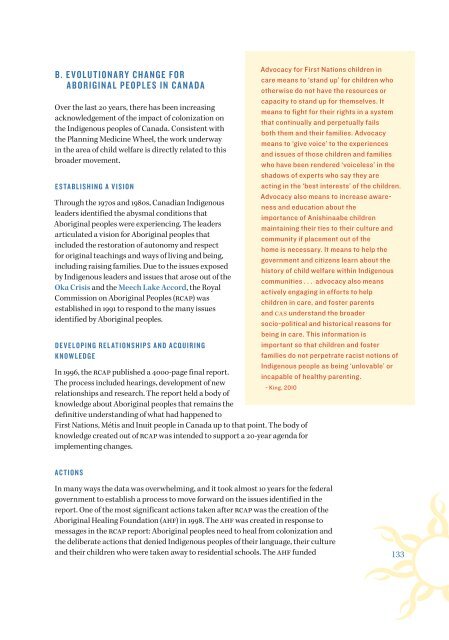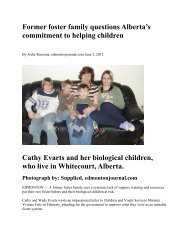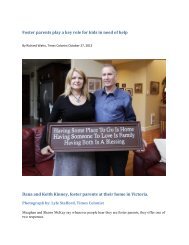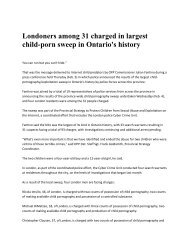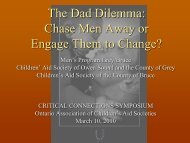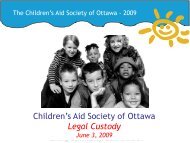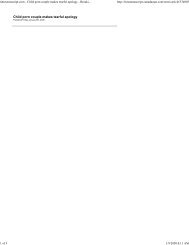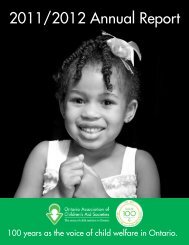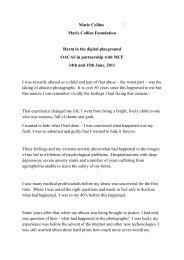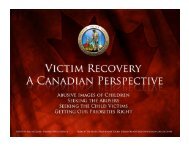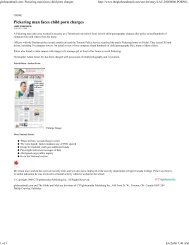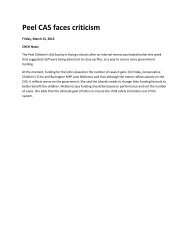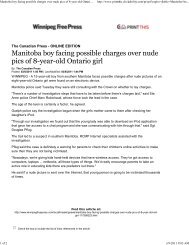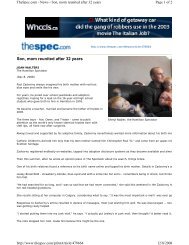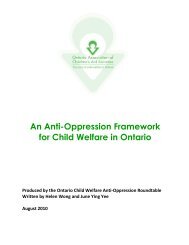English - Ontario Association of Children's Aid Societies
English - Ontario Association of Children's Aid Societies
English - Ontario Association of Children's Aid Societies
Create successful ePaper yourself
Turn your PDF publications into a flip-book with our unique Google optimized e-Paper software.
B. EVOLUTIONARY CHANGE FOR<br />
ABORIGINAL PEOPLES IN CANADA<br />
Over the last 20 years, there has been increasing<br />
acknowledgement <strong>of</strong> the impact <strong>of</strong> colonization on<br />
the Indigenous peoples <strong>of</strong> Canada. Consistent with<br />
the Planning Medicine Wheel, the work underway<br />
in the area <strong>of</strong> child welfare is directly related to this<br />
broader movement.<br />
ESTABLISHING A VISION<br />
Through the 1970s and 1980s, Canadian Indigenous<br />
leaders identified the abysmal conditions that<br />
Aboriginal peoples were experiencing. The leaders<br />
articulated a vision for Aboriginal peoples that<br />
included the restoration <strong>of</strong> autonomy and respect<br />
for original teachings and ways <strong>of</strong> living and being,<br />
including raising families. Due to the issues exposed<br />
by Indigenous leaders and issues that arose out <strong>of</strong> the<br />
Oka Crisis and the Meech Lake Accord, the Royal<br />
Commission on Aboriginal Peoples (RCAP) was<br />
established in 1991 to respond to the many issues<br />
identified by Aboriginal peoples.<br />
DEVELOPING RELATIONSHIPS AND ACQUIRING<br />
KNOWLEDGE<br />
In 1996, the RCAP published a 4000-page final report.<br />
The process included hearings, development <strong>of</strong> new<br />
relationships and research. The report held a body <strong>of</strong><br />
knowledge about Aboriginal peoples that remains the<br />
definitive understanding <strong>of</strong> what had happened to<br />
First Nations, Métis and Inuit people in Canada up to that point. The body <strong>of</strong><br />
knowledge created out <strong>of</strong> RCAP was intended to support a 20-year agenda for<br />
implementing changes.<br />
Advocacy for First Nations children in<br />
care means to ‘stand up’ for children who<br />
otherwise do not have the resources or<br />
capacity to stand up for themselves. It<br />
means to fight for their rights in a system<br />
that continually and perpetually fails<br />
both them and their families. Advocacy<br />
means to ‘give voice’ to the experiences<br />
and issues <strong>of</strong> those children and families<br />
who have been rendered ‘voiceless’ in the<br />
shadows <strong>of</strong> experts who say they are<br />
acting in the ‘best interests’ <strong>of</strong> the children.<br />
Advocacy also means to increase awareness<br />
and education about the<br />
importance <strong>of</strong> Anishinaabe children<br />
maintaining their ties to their culture and<br />
community if placement out <strong>of</strong> the<br />
home is necessary. It means to help the<br />
government and citizens learn about the<br />
history <strong>of</strong> child welfare within Indigenous<br />
communities . . . advocacy also means<br />
actively engaging in efforts to help<br />
children in care, and foster parents<br />
and CAS understand the broader<br />
socio-political and historical reasons for<br />
being in care. This information is<br />
important so that children and foster<br />
families do not perpetrate racist notions <strong>of</strong><br />
Indigenous people as being ‘unlovable’ or<br />
incapable <strong>of</strong> healthy parenting.<br />
- King, 2010<br />
ACTIONS<br />
In many ways the data was overwhelming, and it took almost 10 years for the federal<br />
government to establish a process to move forward on the issues identified in the<br />
report. One <strong>of</strong> the most significant actions taken after RCAP was the creation <strong>of</strong> the<br />
Aboriginal Healing Foundation (AHF) in 1998. The AHF was created in response to<br />
messages in the RCAP report: Aboriginal peoples need to heal from colonization and<br />
the deliberate actions that denied Indigenous peoples <strong>of</strong> their language, their culture<br />
and their children who were taken away to residential schools. The AHF funded<br />
133


